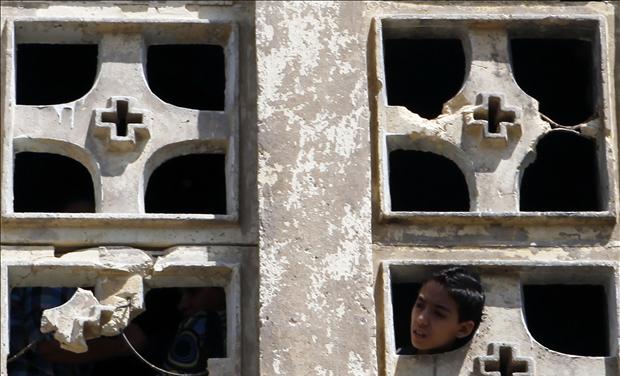A branch leader says MIC should be dissolved if it does not return a plot of land claim to have been allocated for a Tamil schoool.
 KLANG: MIC should be dissolved if it fails to return a plot of land purportedly allocated for a Tamil school in Damansara.
KLANG: MIC should be dissolved if it fails to return a plot of land purportedly allocated for a Tamil school in Damansara.
And the ultimatum came from a MIC grassroots leader himself, Taman Mujur branch chairman V Thiagarajan.
Speaking to FMT, the vexed local leader said MIC would become irrelevant to the Indian community if it continued to overlook the issue.
The Effingham Tamil school is located in Bandar Utama. The accusation about the land grab first surfaced in 2009, with former students and residents of the area claiming that the developer of Bandar Utama had set aside six acres for the school in 1999.
They claimed that the late K Sivalingam, a MIC leader and an executive councillor in the then Barisan Nasional-led Selangor state government, decided that only three acres should be given to the school and the rest to the party.
However, MIC claimed that there was an error in the description of the proprietor in the land title and that the party is the rightful owner of the three acres.
‘I have evidence’
Thiagarajan said that he has evidence that the Bandar Utama developer allocated the land to the school and not MIC.
According to a plan drafted in 1996, the district land office registered the land under the name of the primary school.
“The total size of the land is 12 acres. And the housing developer awarded six acres for both the Tamil school and a religious school respectively,” said Thiagarajan.
“However, in a new plan drafted in 2005, the plot was divided into two separate plots where three acres was for the school and another three acres for MIC,” he added.
He also asked if there was indeed an error, why did MIC take almost 10 years to rectify it?
Refusing to accept the explanation, Thiagarajan claimed that there was something fishy concerning the deal and urged MIC president G Palanivel to return the land.
“Do not turn the Effingham Tamil school issue into another Padang Jawa temple issue like in 2007, where the demolition of the temple was one of the reasons behind MIC’s heavy losses in the 2008 general election,” he warned.
FMT could not reach MIC secretary-general S Murugesan for comments.
 KLANG: MIC should be dissolved if it fails to return a plot of land purportedly allocated for a Tamil school in Damansara.
KLANG: MIC should be dissolved if it fails to return a plot of land purportedly allocated for a Tamil school in Damansara.And the ultimatum came from a MIC grassroots leader himself, Taman Mujur branch chairman V Thiagarajan.
Speaking to FMT, the vexed local leader said MIC would become irrelevant to the Indian community if it continued to overlook the issue.
The Effingham Tamil school is located in Bandar Utama. The accusation about the land grab first surfaced in 2009, with former students and residents of the area claiming that the developer of Bandar Utama had set aside six acres for the school in 1999.
They claimed that the late K Sivalingam, a MIC leader and an executive councillor in the then Barisan Nasional-led Selangor state government, decided that only three acres should be given to the school and the rest to the party.
However, MIC claimed that there was an error in the description of the proprietor in the land title and that the party is the rightful owner of the three acres.
‘I have evidence’
Thiagarajan said that he has evidence that the Bandar Utama developer allocated the land to the school and not MIC.
According to a plan drafted in 1996, the district land office registered the land under the name of the primary school.
“The total size of the land is 12 acres. And the housing developer awarded six acres for both the Tamil school and a religious school respectively,” said Thiagarajan.
“However, in a new plan drafted in 2005, the plot was divided into two separate plots where three acres was for the school and another three acres for MIC,” he added.
He also asked if there was indeed an error, why did MIC take almost 10 years to rectify it?
Refusing to accept the explanation, Thiagarajan claimed that there was something fishy concerning the deal and urged MIC president G Palanivel to return the land.
“Do not turn the Effingham Tamil school issue into another Padang Jawa temple issue like in 2007, where the demolition of the temple was one of the reasons behind MIC’s heavy losses in the 2008 general election,” he warned.
FMT could not reach MIC secretary-general S Murugesan for comments.














 “The
investigation results concluded that there were unethical actions which
were beyond the SOP of the Royal Malaysian Police when enforcement was
performed on rally participants who were wrongly using the hospital
premises,” said Mahmood.
“The
investigation results concluded that there were unethical actions which
were beyond the SOP of the Royal Malaysian Police when enforcement was
performed on rally participants who were wrongly using the hospital
premises,” said Mahmood.  “However,
allegations that there was tear gas fired inside the hospital compound
are not true because it happened at a public carpark outside the
hospital compound,” said Mahmood.
“However,
allegations that there was tear gas fired inside the hospital compound
are not true because it happened at a public carpark outside the
hospital compound,” said Mahmood.  “(The
Home Ministry) will not compromise on disciplinary action if it is
found that there are (staff) who are proven to have violated operational
guidelines,” he said.
“(The
Home Ministry) will not compromise on disciplinary action if it is
found that there are (staff) who are proven to have violated operational
guidelines,” he said. 






